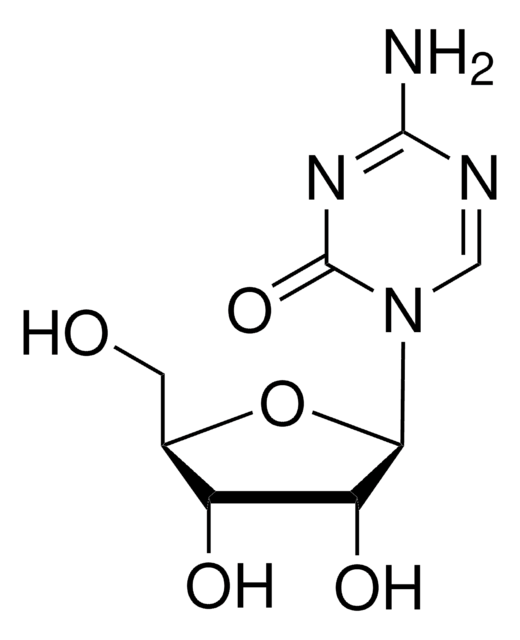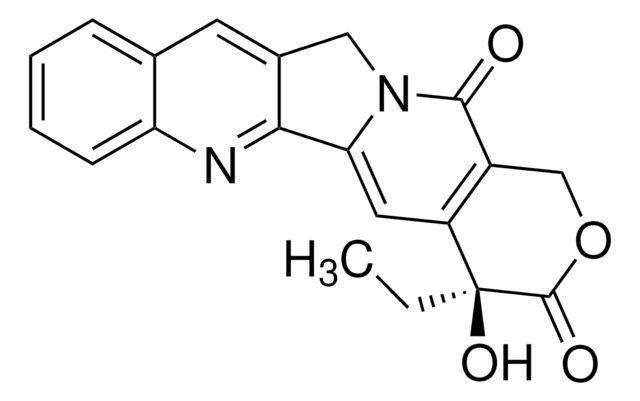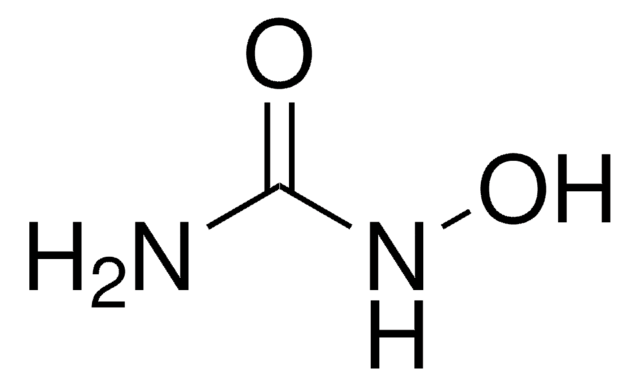E1383
Etoposide
95.0-105.0% (anhydrous basis), powder, topoisomerase II inhibitor
Sinónimos:
4′-Demethylepipodophyllotoxin 9-(4,6-O-ethylidene-β-D-glucopyranoside), VP-16-213
About This Item
Productos recomendados
product name
Etoposide, synthetic, 95.0-105.0%, powder
biological source
synthetic
assay
95.0-105.0%
form
powder
color
white to off-white
pKa
9.8
mp
236-251 °C (lit.)
antibiotic activity spectrum
neoplastics
mode of action
DNA synthesis | interferes
enzyme | inhibits
originator
Teva
SMILES string
COc1cc(cc(OC)c1O)[C@H]2[C@@H]3[C@H](COC3=O)[C@H](O[C@@H]4O[C@@H]5CO[C@@H](C)O[C@H]5[C@H](O)[C@H]4O)c6cc7OCOc7cc26
InChI
1S/C29H32O13/c1-11-36-9-20-27(40-11)24(31)25(32)29(41-20)42-26-14-7-17-16(38-10-39-17)6-13(14)21(22-15(26)8-37-28(22)33)12-4-18(34-2)23(30)19(5-12)35-3/h4-7,11,15,20-22,24-27,29-32H,8-10H2,1-3H3/t11-,15+,20-,21-,22+,24-,25-,26-,27-,29+/m1/s1
InChI key
VJJPUSNTGOMMGY-MRVIYFEKSA-N
Gene Information
human ... ABCB1(5243) , CYP3A4(1576) , TOP2A(7153) , TOP2B(7155)
mouse ... Abcb1a(18671) , Abcb1b(18669)
rat ... Top2a(360243)
¿Está buscando productos similares? Visita Guía de comparación de productos
General description
Application
- to prepare drug stock solution in dimethyl sulfoxide (DMSO) and also to profile and compare the sensitivity of DT40 mutant cells
- to incubate cells for cell viability assay
- to treat neuro-2A cells to induce programmed cell death
Biochem/physiol Actions
Features and Benefits
Packaging
signalword
Danger
hcodes
Hazard Classifications
Acute Tox. 4 Oral - Carc. 1B - Repr. 2
Storage Class
6.1C - Combustible acute toxic Cat.3 / toxic compounds or compounds which causing chronic effects
wgk_germany
WGK 3
ppe
Eyeshields, Gloves, type P3 (EN 143) respirator cartridges
Certificados de análisis (COA)
Busque Certificados de análisis (COA) introduciendo el número de lote del producto. Los números de lote se encuentran en la etiqueta del producto después de las palabras «Lot» o «Batch»
¿Ya tiene este producto?
Encuentre la documentación para los productos que ha comprado recientemente en la Biblioteca de documentos.
Artículos
We presents an article on ABC Transporters and Cancer Drug Resistance
Contenido relacionado
n proliferating cells, the cell cycle consists of four phases. Gap 1 (G1) is the interval between mitosis and DNA replication that is characterized by cell growth. Replication of DNA occurs during the synthesis (S) phase, which is followed by a second gap phase (G2) during which growth and preparation for cell division occurs. Together, these three stages comprise the interphase phase of the cell cycle. Interphase is followed by the mitotic (M) phase.
Apoptosis, or programmed cell death (PCD), is a selective process for the removal of unnecessary, infected or transformed cells in various biological systems. As it plays a role in the homeostasis of multicellular organisms, apoptosis is tightly regulated through two principal pathways by a number of regulatory and effector molecules.
Discover Bioactive Small Molecules for ADME/Tox
Nuestro equipo de científicos tiene experiencia en todas las áreas de investigación: Ciencias de la vida, Ciencia de los materiales, Síntesis química, Cromatografía, Analítica y muchas otras.
Póngase en contacto con el Servicio técnico






